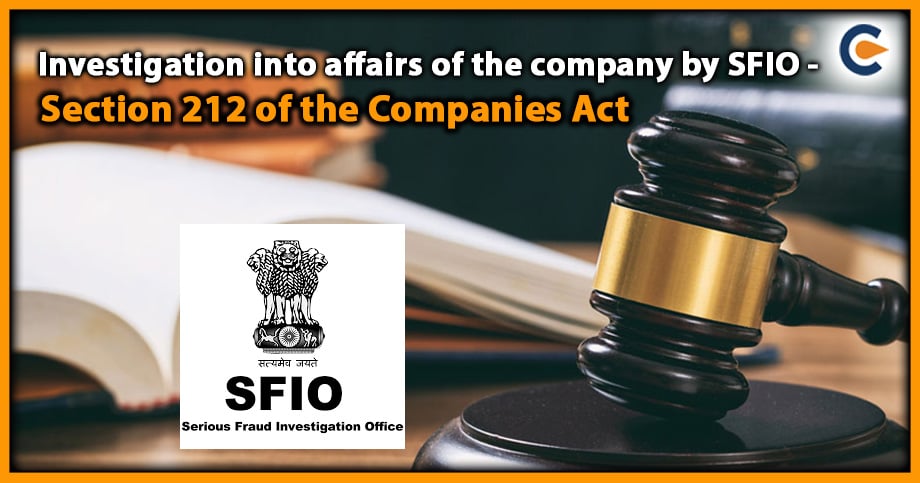The Serious Fraud Investigation Office (SFIO) is a body established by the Central Government under the Ministry of Corporate Affairs. This was created for a specific reason: to investigate the company’s serious matters, especially white-collar crimes and frauds. Moreover, this organization consists of experts in taxation, company law, information technology, accountancy, investigation, law, forensic auditing and capital market. This makes it easier for the SFIO to track the fraud of the company. Section 212 of the Companies Act 2013 lays down provisions for the investigation, power and duties of the SFIO. Furthermore, SFIO investigates the matters that are transferred to them by the Central Government.
Purpose of Establishment of Serious Fraud Investigation Office (SFIO)
The Serious Fraud Investigation Office was established by the Central Government by passing a resolution on July 2, 2022. Whereas it took eleven years to come into effect, the act came into effect on March 26, 2014. This is a multi-disciplinary organization consisting of experts in different fields. They only investigate into matters of fraud and white-collar crime in the company.
The SFIO only investigates matters that are complex in nature and has the involvement of more than one department. Moreover, the cases must involve public interest either in terms of money or in terms of the number of people affected. This department will be responsible for investigating matters of serious fraud by the company received from the Department of Company Affairs. The purpose of this investigation is to improve the system while improving the laws and procedures of the company.
Role of Serious Fraud Investigation Office under the Companies Act, 2013
The SFIO does not have statutory recognition in the Companies Act, 1956. Section 235 of the 1956 Act permitted a company member to request an investigation of the business’s operations. A company’s affairs may be investigated under Section 210 of the Act, which generally corresponds to Section 235 of the 1956 Act.
According to Section 210(1) of the Companies Act, 2013, the Central Government “may” order an investigation into the matters of a company if it believes that it is necessary based on any of the following: (a) receiving a report from the Registrar or inspector under Section 208; (b) a special resolution passed by a company stating that the affairs of the company must be investigated; or (c) in the public interest. The term “may” is used to imply that the Central Government has discretion and is not required to compel an inquiry.
On the other hand, Section 210(2) stipulates that the Central Government “shall” order an investigation into the company’s operations when a court or tribunal issues a ruling to this effect.
Overview of Section 212 of the Companies Act, 2013
Section 212 of the Companies Act of 2013 lists all the requirements of the Special Fraud Investigation Office, starting from its establishment to the investigation and submission of reports. Central Government is the body governing the SFIO, and this body works on the order of the Central Government. Moreover, the report of the investigation is also submitted to the Central Government. The SFIO investigates matters of fraud or white-collar crimes in the company only on the order of the Central Government. Furthermore, the Director is the head of SFIO and is responsible for forming a team for investigation as per the case requirement.
At the time when Serious Fraud Investigation Office is investigating the matter, no other government agency can investigate the same matter. In case any agency is already investigating the matter, they must stop the investigation and hand over the important reports and details to the SFIO. The power of arrest in such matters is given only to the Assistant Director or officer above his rank. Also, the person arrested on the basis of an investigation by the SFIO can get bail only on a few specified grounds.
After the investigation, the Special Fraud Investigating Office has to submit an investigation report to the Central Government.
Process of Investigation by the SFIO: Section 212 (1) – Section 212 (7) Of the Companies Act
- Central Government can transfer serious cases to the SFIO if deemed necessary:
- On the report of the Registrar of Inspector
- If the company passes a special resolution on the issue that the practices of the company shall be investigated.
- If the company has harmed the public interest.
- If a request for the investigation is made by any government department of the centre of the state.
The company government will assign the case to the SFIO and order the organization to investigate into the required matter. Upon receiving the order from the Government, the Director (head of the organization) will check the issue and make a team of officers as required to investigate the matter.
- As per section 212(2), once the matter has been transferred to the SFIO, no other government agency can interfere in the process, and no additional investigation can be initiated for the same matter. If any agency is already investigating the matter, they shall stop the investigation and transfer all the necessary information along with the required documents to the SFIO.
- While assigning the case to the SFIO, the central Government specifies the time duration in which the investigation must be completed. Therefore, while conducting the investigation, the investigation agency must follow the manner and procedure as prescribed in the Companies Act, 2013. The report of the investigation has to be submitted to the Central Government within the specified time.
- The investigation will be conducted by the officer of the Special Fraud Investigation Office, who has been given the power of inspector by the Director. He has the power of inspector as defined under Section 217 of the Companies Act, 2013.
- During the investigation, the company and its employees must provide all the required details, including documents, information, and explanation, to the investigating officer and corporate with them as and when required.
- The person found accused of any offence during the investigation process will be released on bail only on two conditions:
- The court has given the opportunity to the public prosecutor to deny the allegations framed on the accused.
- While denying the allegations, if the court is satisfied by the arguments of the public prosecutor and thinks that the denial of allegations is on reasonable ground and the person is innocent, then the court can grant bail.
- A minor below the age of sixteen, a woman, or a sick person may be granted bail on the directions of the special court. In contrast, the special court will take cognizable of any office only on the complaint made in writing either by the Director of the Special Fraud Investigation Officer or by any officer of the Central Government who is authorized to do so by an order in this regard.
The Procedure of Arrest by the SFIO: Section 212 (8) – Section 212 (10)
- An authorized officer of the Serious Fraud Investigation Office not below the rank of Assistant Director may arrest a person if he has believes that the person has committed the offence and has sufficient grounds to prove the same. Moreover, the grounds of arrest shall be communicated to the arrested person as soon as possible.
- Immediately after the arrest, the authorized officer under section 212 (8) has to forward the copy of the order and other materials in his possession to the Serious Fraud Investigation Office in a sealed packed envelope. The transfer to all the materials and order shall be made in the prescribed manner, and the SFIO will keep the order and material time at the specified time.
- The person arrested shall be taken to the judicial or metropolitan magistrate having jurisdiction in the matter within 24 hours. It is to be noted that the 24 hours’ time does not include the time required for travel from the place of arrest to the magistrate’s office.
Provisions related to Investigation Report: Section 212 (11) – Section 212 (17) of the Companies Act, 2013
- On the direction of the Central Government, the SFIO may submit the interim report to the Central Government.
- Once the investigation procedure is complete, the Serious Fraud Investigation Office is also required to submit the investigation report to the Central Government.
- If any person wishes to see the investigation report, then he can submit an application to the court and get a copy of the investigation report.
- After a proper examination of the investigation report, the Central Government may direct the SFIO to start prosecution against the company or its employees or any other person related to the company either directly or indirectly.
If it is stated in the investigation report that the company has committed any severe fraud and if any direct, key managerial person or any other officer or employee of the company is proven to take advantage of the situation in any manner either by the way of asset, cash, etc. The central Government can make an application to the tribunal to either take away the asset earned by fraud or hold the person individually liable for his acts without any limitation of liability.
- The investigation report submitted to the special court for framing charges against the accused will be treated as similar to a report submitted by the police officer under section 173 of the Code of Criminal Procedure, 1973.
- Any actions taken by the Serious Fraud Investigation Office in the investigation report as per the provisions of the Companies Act, 1956[1] will proceed as per the same act assuming that the Companies Act, 2013 does not exist.
- Any other investigating agency, State Government, police authority, or income-tax authority with any information or documents regarding any offence under investigation by the Serious Fraud Investigation Office shall provide all such information or documents to the Serious Fraud Investigation Office;
Any information or documents that the Serious Fraud Investigation Office has that might be relevant or helpful to an investigating agency, state government, police authority, or income tax authority in regard to an offence or other matter that it is looking into or examining in accordance with another law must be shared with that investigating agency, state government, police authority, or income tax authority.
Takeaway
In order to stop financial fraud from happening in the Indian economy, SFIO was established. The Serious Fraud Investigation Office’s authority and responsibilities are covered under Section 212 of the Companies Act of 2013. It gives SFIO the authority to look into any business that infringes the law or has been involved in a conspiracy, fraud, money laundering, or poor management. The SFIO has the authority to request information and documents, seize and take custody of the company’s books of accounts and records, cross-examine witnesses in the case, and give instructions and directives regarding the subjects of the investigation. The Central Government also has the authority to request special inquiries into other company law-related issues. This section thoroughly summarises the investigational process that the Serious Fraud Investigation Office will use to monitor the incidence of financial fraud.
Read Our Article: Types Of Companies Under Companies Act, 2013











